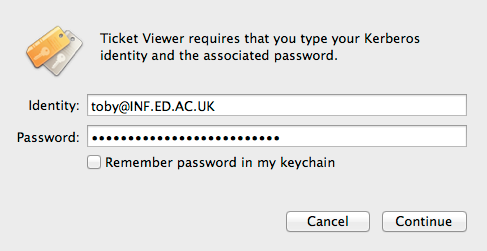


Replace /etc/nf with your OS-specific Fermilab-supplied version of nf.Error message: kinit(v5): Cannot find KDC for requested realm while getting initial credentials Problem: /etc/nf file does not contain. Solution: Please see the User Accounts web page for more information on renewing your Kerberos account. Scripting on this page tracks web page traffic, but does not change the content in any way.Error message: kinit: krb5_get_init_creds: Error from KDC: CLIENT EXPIRED Problem: Your Kerberos account has expired.
KINIT COMMAND WITH PASSWORD LICENSE
Use is subject to license terms and the documentation redistribution policy. Kinit -f -p -c FILE:C:\Windows\Users\duke\credentials\krb5cc_cafebeef the help menu for the kinit tool:Ĭopyright © 1993, 2021, Oracle and/or its affiliates, 500 Oracle Parkway, Redwood Shores, CA 94065 USA.Īll rights reserved. Kinit -p -c FILE:C:\Windows\Users\duke\credentials\krb5cc_cafebeef proxiable and forwardable credentials for a different principal and stores these credentials in a specified file cache: Kinit -R an existing renewable TGT for the specified principal. The renewed ticket can be renewed repeatedly within 10 hours from its initial request. Users must renew a ticket before it has expired. Kinit -l 1h -r 10h a TGT for the specified principal that will expire in 1 hour but is renewable for up to 10 hours. Kinit proxiable credentials for a different principal and store these credentials in a specified file cache: Requests credentials valid for authentication from the current client host, for the default services, storing the credentials cache in the default location ( C:\Windows\Users\duke\krb5cc_duke): Run kinit -help to display the instructions above. Don't specify this on the command line or in a script. Principal The principal name (for example, The principal's Kerberos password. t keytab_filename The keytab name (for example, D:\winnt\profiles\duke\krb5.keytab). r renewable_time Sets the total lifetime that a ticket can be renewed. See the MIT krb5 Time Duration definition for more information. The value can be one of "h:m", "NdNhNmNs", and "N". l lifetime Sets the lifetime of a ticket. c cache_name The cache name (for example, FILE:D:\temp\mykrb5cc). After the command, specify the options for it. You can specify one of the following commands.
KINIT COMMAND WITH PASSWORD PASSWORD
Don't specify your password in a script or provide your password on the command line. The password option is provided only for testing purposes. If you don't specify the password using the password option on the command line, the kinit tool prompts you for the password. If the keytab name isn't specified in the Kerberos configuration file, the kinit tool assumes that the name is USER_HOME \krb5.keytab For example, on Windows, the cache file could be C:\Windows\Users\duke\krb5cc_duke, in which duke is the USER_NAME and C:\Windows\Users\duke is the USER_HOME.īy default, the keytab name is retrieved from the Kerberos configuration file. This user name could be different than the user's principal name. USER_NAME is the operating system's login user name. If USER_HOME is null, the cache file is stored in the current directory from which the program is running. USER_NAME is obtained from the property user.name. The identifier USER_HOME is obtained from the property. The user must be registered as a principal with the Key Distribution Center (KDC) prior to running kinit.īy default, on Windows, a cache file named USER_HOME \krb5cc_ USER_NAME is generated.

This tool is similar in functionality to the kinit tool that is commonly found in other Kerberos implementations, such as SEAM and MIT Reference implementations. Kinit - obtain and cache Kerberos ticket-granting tickets Synopsis


 0 kommentar(er)
0 kommentar(er)
